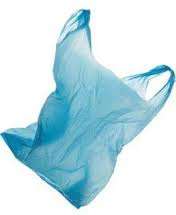Plastic shopping bags are free and legal in Wisconsin town, for now

By Ryan Ekvall | Wisconsin Reporter
STOUGHTON, Wis. — This city of 12,000 southeast of Madison could become the first municipality in Wisconsin to restrict the use of plastic grocery bags.
That restriction could come as an added fee shoppers pay at checkout, or as an outright ban.
If adopted, Stoughton would join the ranks of Eugene, Ore., Austin, Tex., and scores of cities up and down the California coast that have banned or taxed plastic grocery bags. Lawmakers in California are considering a statewide ban, something Wisconsin lawmakers studied in 2009.
BAN ‘EM?:Prompted by a citizen wanting to help the environment, Stoughton city officials are considering a ban on plastic shopping bags.
Prompted by a letter from resident Jill Izydor, who was looking to do something good for the environment, Mayor Donna Olson sent an email Nov. 8 to City Council and public works officials asking them for “discussion and possible action” on implementing the ban of single-use plastic bags.
Most “top places to live” lists include a green category, Izydor wrote, implying that perhaps a bag ban would land Stoughton on one of those lists.
“My thoughts are the greener we make our city the more desirable it will be in terms of a place to visit, live and own a business,” Izydor wrote.
But since then, Izydor told Wisconsin Reporter, she’s become more interested in a tax on plastic and paper bags, rather than seek an outright ban.
“… Consumers would be confronted with the fact that using a single use-bag has an environmental impact and a municipal impact in terms of cleanup costs,” Izydor said. “(Shoppers) hopefully would be encouraged to bring their own bags.”
After meeting with Izydor in December, city officials drafted an online survey to gauge residents’ thoughts on a 5-cent tax on grocery bags. Only 1 percent of the city’s population, 125 people, responded to the survey, said Karl Manthe, the city’s streets superintendent.
Much of the rest of the planning for a ban hasn’t been done.
City officials have not contacted town retailers or trash collectors.
Olson did not return a call from Wisconsin Reporter seeking comment on the ban.
Still, all options are on the table. Manthe said the Public Works Committee could move the issue to the City Council for consideration as soon as next month.
Until Stoughton residents have the government tell them what to do, they will have to settle for the alternatives to dealing with the plastic bag.
The local Pick ‘n Save, part of one of the state’s largest grocery chains, encourages customers to return plastic bags for recycling. But employees there, when asked by Wisconsin Reporter, said they could not comment. A corporate spokesman did not return calls seeking comment.
While city officials prefer to use the term single use to describe the plastic bags, there are no reliable statistics an industry survey reports 92 percent of adults reuse their bags. It’s safe to say that many people get a second use from the bags for their trash or their dog’s droppings.
A United Kingdom Environmental Agency study of plastic grocery bags versus other types of shopping bags — paper, cotton and others — showed that paper bags would need to be used seven times and other bags between nine and 327 times before being a better option environmentally than the plastic bag, assuming that plastic bag is reused once.
Jon Getjes, president of John’s Disposal, which services 45 Wisconsin communities, including Stoughton said, “The amount of space plastic bags take up (in the landfill) is negligible. It’s extremely small.”
A 2009 Waste Characterization Report prepared for the state Department of Natural Resources found plastic shopping bags make up 0.2 percent of all waste materials. Newspapers comprise more than five times as much waste as plastic shopping bags.
Madison city officials considered a plastic shopping ban, but in 2012 decided to expand curbside recycling options instead.
Plastic bags do pose a different kind of problem, Getjes said, such as getting wrapped around the equipment shafts used to separate recyclables from trash, costing his company man-hours to remove them.
Litter is the larger problem with plastic bags, he said. Bags turn into parachutes and sail into the air only to land in ponds or ditches, where they can wreak havoc on wildlife.
But would a ban on bags in Stoughton stop that?
“I question how effective it would be,” Getjes said of the proposed bag restrictions. “A lot of (Stoughton residents) work in Madison. You can go to Walmart or a grocery store anywhere else — how would you ever keep them out of the city?”
Contact Ryan Ekvall at rekvall@watchdog.org or 608-257-1382 or follow him on Twitter @Nockian.
The post Plastic shopping bags are free and legal in Wisconsin town, for now appeared first on Watchdog.org.







